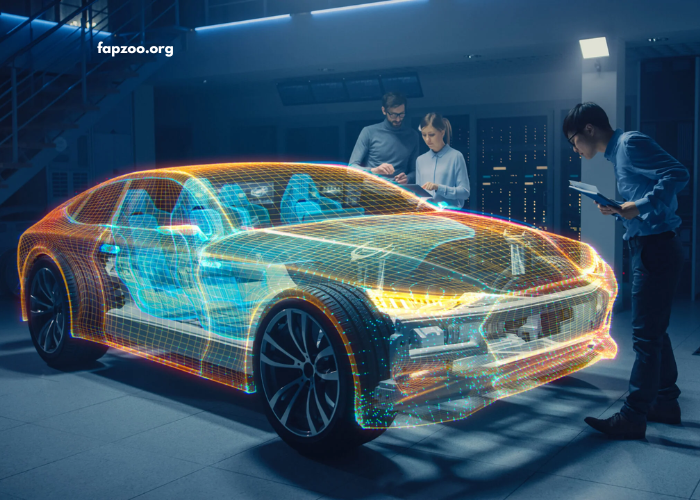The digital landscape is evolving rapidly, driven by technological advancements that continually reshape our world. From artificial intelligence (AI) to blockchain, quantum computing to 5G connectivity, the pace of change is accelerating, creating new opportunities and challenges for individuals, businesses, and entire industries. As we look ahead, understanding the key tech trends shaping the future is essential for staying competitive and prepared for what lies ahead.
In this article, we’ll explore the most significant tech trends to expect in the near and distant future, their implications, and how they are expected to impact various sectors. Whether you’re a tech enthusiast, entrepreneur, or business leader, this guide will help you navigate the exciting possibilities and prepare for the digital future.
The Rise of Artificial Intelligence (AI) and Machine Learning
AI’s Transformative Impact Across Industries
Artificial intelligence (AI) is no longer a futuristic concept but a present-day reality. Over the past decade, AI has made significant strides, transitioning from simple automation to advanced systems capable of understanding, learning, and making decisions. Machine learning (ML), a subset of AI, enables computers to learn from data patterns without being explicitly programmed.
In the future, AI is expected to revolutionize a broad spectrum of industries. Here are a few key areas where AI is making waves:
- Healthcare: AI is enhancing diagnostic accuracy, predicting patient outcomes, and assisting in drug discovery. Machine learning algorithms are already helping doctors detect conditions like cancer and heart disease at early stages, improving patient care and outcomes.
- Finance: AI-driven algorithms are improving fraud detection, credit scoring, and investment strategies. Robo-advisors, powered by AI, are making financial planning more accessible and affordable.
- Customer Service: Chatbots and virtual assistants powered by AI are already being used in customer service, offering round-the-clock support and improving response times.
The Ethical Implications of AI
As AI continues to advance, concerns surrounding privacy, bias, and ethics are becoming more prominent. The future of AI will require strict guidelines and regulations to ensure it is used responsibly. Additionally, industries will need to address the social and economic impacts of AI, including job displacement and the need for reskilling.
The Evolution of 5G Connectivity
What is 5G and How Will It Change the World?
5G, the fifth generation of wireless technology, is set to bring significant improvements in speed, capacity, and latency compared to its predecessors. The rollout of 5G networks is already underway, and the impact on various sectors will be profound. Here’s how:
- Faster Internet Speeds: 5G will deliver download speeds up to 100 times faster than 4G, enabling users to stream high-quality videos, download large files, and play cloud-based games with minimal lag.
- Enhanced IoT Capabilities: The Internet of Things (IoT) is expected to experience exponential growth with the arrival of 5G. Faster, more reliable connectivity will enable millions of devices to communicate seamlessly, transforming smart cities, agriculture, manufacturing, and logistics.
- Autonomous Vehicles: Self-driving cars and drones depend on ultra-fast, low-latency networks for real-time communication. 5G will provide the necessary infrastructure to support these technologies, accelerating their widespread adoption.
- Healthcare Advancements: 5G will support telemedicine and remote surgery, enabling healthcare professionals to provide care to patients in remote locations. High-speed, low-latency connections will ensure that real-time consultations and procedures can take place seamlessly.
The Global Rollout of 5G
While 5G holds great promise, its widespread adoption will take time. Initially, urban areas and developed countries will see the benefits of 5G, while rural and less-developed regions may experience slower implementation. Nevertheless, the global rollout of 5G will continue to be a game-changer for digital transformation.
Quantum Computing: The Next Frontier
What is Quantum Computing?
Quantum computing is a groundbreaking technology that leverages the principles of quantum mechanics to process information in fundamentally new ways. Unlike classical computers, which use binary bits (0 or 1) to represent data, quantum computers use quantum bits (qubits), which can exist in multiple states simultaneously. This enables quantum computers to perform complex calculations much faster than traditional computers.
The Potential of Quantum Computing
Quantum computing holds enormous potential for solving problems that are currently beyond the capabilities of classical computers. Some of the most exciting applications include:
- Drug Discovery: Quantum computers could simulate molecular interactions at an unprecedented level of detail, revolutionizing drug discovery and leading to faster development of life-saving medications.
- Cryptography: Quantum computing has the potential to break existing encryption methods, but it also offers the possibility of creating unbreakable encryption systems using quantum key distribution (QKD).
- Optimization Problems: Quantum algorithms can tackle complex optimization problems in areas such as logistics, finance, and supply chain management, leading to more efficient solutions.
The Road Ahead for Quantum Computing
Quantum computing is still in its infancy, with many technical challenges to overcome. However, significant investments are being made by tech giants like Google, IBM, and Microsoft, and we are likely to see practical applications emerge in the next decade. While it may take several years before quantum computers are widely accessible, their potential to transform industries is undeniable.
Blockchain and Decentralized Technologies
The Blockchain Revolution
Blockchain, the decentralized ledger technology behind cryptocurrencies like Bitcoin, has garnered significant attention in recent years. However, its potential extends far beyond digital currencies. In the future, blockchain is expected to play a crucial role in various sectors, including:
- Supply Chain Management: Blockchain can provide transparent, tamper-proof records of goods as they move through the supply chain. This could help reduce fraud, enhance traceability, and improve efficiency.
- Voting Systems: Blockchain could provide secure and transparent voting systems, reducing the risk of election fraud and ensuring that votes are counted accurately.
- Smart Contracts: These self-executing contracts, powered by blockchain technology, automatically execute terms when certain conditions are met. Smart contracts have the potential to revolutionize industries such as real estate, law, and finance.
Decentralization and the Future of the Web
The rise of decentralized technologies is poised to reshape the internet. Web3, a new iteration of the web, is built on blockchain and decentralized networks, empowering users to own their data and engage in peer-to-peer transactions without relying on centralized platforms.
Challenges to Blockchain Adoption
Despite its promise, blockchain technology faces significant challenges, including scalability issues, regulatory uncertainty, and energy consumption concerns. As these challenges are addressed, blockchain could become an integral part of the digital future.
Augmented Reality (AR) and Virtual Reality (VR)
AR and VR: Transforming Experiences
Augmented reality (AR) and virtual reality (VR) are technologies that offer immersive experiences by blending digital content with the physical world (AR) or creating entirely digital environments (VR). These technologies are already making an impact in industries such as gaming, entertainment, and education, and their potential is vast.
- Gaming: The gaming industry is already experiencing a revolution with the introduction of VR headsets and AR-based games. In the future, AR and VR could create even more immersive gaming experiences, blurring the lines between the virtual and real worlds.
- Healthcare: AR and VR are being used for medical training, allowing surgeons to practice procedures in a virtual environment before performing them on real patients. Additionally, VR is being used for pain management and mental health therapy.
- Education: AR and VR have the potential to transform education by offering interactive, immersive learning experiences. Students could explore historical events, conduct virtual science experiments, and even visit distant planets without leaving the classroom.
The Future of AR and VR
The future of AR and VR will depend on the development of more affordable, accessible, and high-quality devices. As these technologies become more mainstream, we can expect them to play an increasingly important role in entertainment, education, and professional training.
The Integration of Robotics and Automation
Robotics in the Workforce
Robots and automation are poised to become an integral part of the workforce in the coming years. From manufacturing to logistics, robots are already performing tasks that were once done by humans. In the future, we can expect to see even more advanced robots working alongside humans, performing complex tasks and increasing efficiency.
- Manufacturing: Industrial robots are already revolutionizing manufacturing by automating repetitive tasks and improving precision. Future robots may take on more complex roles, such as assembling intricate products or working in hazardous environments.
- Healthcare: Robots are increasingly being used in surgery, where they can perform precise, minimally invasive procedures. Additionally, robots can assist in patient care, from delivering medications to helping with mobility.
- Home Automation: In the future, robots could play a more significant role in home automation, from cleaning to cooking, offering increased convenience for homeowners.
Challenges and Opportunities in Robotics
While the integration of robotics and automation offers numerous benefits, it also raises concerns about job displacement and the ethical implications of machines performing tasks traditionally carried out by humans. As technology advances, it will be crucial to strike a balance between automation and human labor.
Conclusion
As we look toward the digital future, it’s clear that the tech trends outlined above will play a crucial role in shaping the world we live in. From AI and 5G to quantum computing and blockchain, these technologies will revolutionize industries, improve efficiencies, and create new opportunities for innovation. While challenges remain, the potential for positive change is enormous.
For businesses and individuals alike, staying ahead of these trends and adapting to the ever-changing digital landscape will be key to success. Embrace the future, and prepare for a world where technology continues to transform every aspect of our lives. The digital future is already here—are you ready for it?



